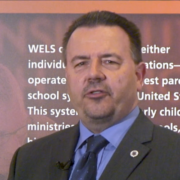To Voucher or Not to Voucher
That is a question many more WELS school leaders are asking themselves. Government-funded programs that give parents vouchers or tax credits for school tuition are on our national landscape for the foreseeable future. Accepting state funding for tuition in WELS schools has been implemented for at least 20 years. It is a somewhat controversial concept in our Lutheran schools and congregations. Leaders have to decide whether they will participate. And why!
Common arguments for participation include increased enrollments and huge income sources that, in some cases, fund big building campaigns.
Common arguments against participation are government intervention in school ministries, potential for compromising Lutheran values and beliefs to meet government requirements, and sudden loss of funding in the event the subsidies stop.
What criteria should school leaders use in determining participation in such a program?
The place to start is the school mission statement. School leaders need to ask, “What is our school mission and purpose?” Then ask, “Does participation in a voucher program fit in our school’s mission?” The mission of every Lutheran school should boil down to Christ’s Great Commission to “Go and make disciples of all nations” (Matthew 28:19). Does it fulfill the Great Commission to accept state funding so that students who could not afford a tuition-based Lutheran school can receive a Christian education?
I recently completed a study on WELS schools and the use of voucher programs. Of 51 principals in funded schools who were surveyed, 96% of them believe the state funding program fits within the mission of their school. Nearly 80% of all the schools that participate in a program find the program to be a blessing to the school. Nearly 100% of the principals in those schools identified one or more specific blessings, such as financial stability, increased enrollments, funding for salaries and facilities, and a more diversified student body. Most importantly, 48 of 51 principals identified the blessing of more ministry opportunities through the funding program. More kids are being connected with the gospel.
Not only are voucher programs a blessing to school ministries, they are a blessing to the young souls who come to our Lutheran schools through them. My survey results identified numerous blessings students receive because they were able to enroll with a voucher. Most importantly, these students benefited from a Christian education and were nurtured in their Christian faith. They also were blessed with Christian role models, improved academics, and more opportunities to use their talents.
Some may assume that voucher programs must cause some problems for the school. On the contrary, only 4% of principals surveyed believed the program creates problems. Several principals did identify more challenges with higher enrollment and increased paperwork. Over 80% of those surveyed identified increased administrative responsibilities as a big challenge.
Even though the blessings seem to far outweigh the problems and challenges, big question marks remain. What happens if the government attaches new strings to these vouchers or tax credits? What happens if state legislation brings a sudden end to these programs? Then what? Schools are wise to have an exit plan in place in case such changes arise in government policy. The large majority of the participating WELS schools in my survey have some type of exit plan in place, such as temporary emergency funding or downsizing the staff. Funding or legislation could possibly change in the future, but only the Lord knows for sure.
In the meantime, what should Lutheran schools decide when faced with this funding opportunity? WELS leaders need not be fearful about participation in such programs. Following the careful and thoughtful process of many WELS schools and their leaders who have instituted these programs, educational leaders should seize the opportunity that is before them to reach out with the gospel to more people in their community.
The conditions today for this strategy may work very well for expanding ministry. Make the most of it! Those conditions may change next year or next decade, but that is no different from other challenging changes WELS churches and schools have experienced over the years.
The door has opened in recent decades for early childhood ministry, and many WELS churches have seized the opportunity. The door has opened for congregational ministry to immigrant groups in a number of U.S. cities. How long the door will be open for WELS schools to participate in state funding programs is unknown, so WELS school leaders should be bold and seize the opportunity while it is here.
Read Rendy Koeppel’s Thesis here:
Written by Rendy Koeppel. Rendy Koeppel (DMLC ’81, MLC ’18) is a principal and teacher at St. Paul’s-First Lutheran School – North Hollywood, California. He recently completed his MS in Educational Administration at Martin Luther College. This article is shared with permission from MLC Graduate Studies.
WELS Congregational Services
Learn about the ministry work of WELS Congregational Services.
Give a Gift
You can make a difference. Your prayers and gifts can help WELS ministries carry out their missions.






